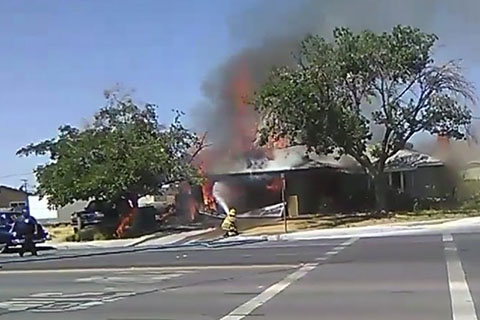By JOHN ANTCZAK and OLGA R. RODRIGUEZ
LOS ANGELES (AP) — The strongest earthquake in 20 years shook a large swath of Southern California and parts of Nevada on the July 4th holiday, rattling nerves and causing injuries and damage in a town near the epicenter, followed by a swarm of ongoing aftershocks.
The 6.4 magnitude quake struck at 10:33 a.m. Thursday in the Mojave Desert, about 150 miles (240 kilometers) northeast of Los Angeles, near the town of Ridgecrest, California.
Multiple injuries and two house fires were reported in the town of 28,000. Emergency crews dealt with small vegetation fires, gas leaks and reports of cracked roads, said Kern County Fire Chief David Witt.
Ridgecrest Mayor Peggy Breeden said that utility workers were assessing broken gas lines and turning off gas where necessary.
A widely felt magnitude 5.4 quake before dawn Friday was the strongest aftershock thus far. Seismologists had said there was an 80 percent probability of an aftershock of that strength within a week.
The local senior center was holding a July 4th event when Thursday’s big quake hit and everyone made it out shaken up but without injuries, she said.
“Oh, my goodness, there’s another one (quake) right now,” Breeden said on live television as an aftershock struck.
Breeden noted at a news conference that other nearby governments have offered to help the recovery effort.
President Donald Trump said he was fully briefed on the earthquake and that it “all seems to be very much under control!”
Police and fire officials said at a news conference Thursday afternoon that they have enough resources so far to meet needs in the wake of the earthquake.
California Highway Patrol Lt. John Williams said officials have found cracks on several roads in the county, but overpasses and underpasses are in good shape.
“It almost gave me a heart attack,” said Cora Burke, a waitress at Midway Cafe in Ridgecrest, of the big jolt. “It’s just a rolling feeling inside the building, inside the cafe and all of a sudden everything started falling off the shelf, glasses, the refrigerator and everything in the small refrigerator fell over.”
Video posted online of a liquor store in Ridgecrest showed the aisles filled with broken wine and liquor bottles, knocked down boxes and other groceries strewn on the floor. Flames were seen shooting out of one home in the community.
Lucy Jones, a seismologist with the California Institute of Technology’s seismology lab, said the earthquake was the strongest since a 7.1 quake struck in the area on October 16, 1999.
“This has been an extremely quiet abnormal time,” Jones said. “This type of earthquake is much more normal … The long term average is probably once every five or 10 years somewhere in Southern California.”
Jones said that the 6.4 quake was preceded by a magnitude 4.2 temblor about a half hour earlier.
The epicenter was in the arid expanse of Searles Valley, a sparsely populated region.
“This is an isolated enough location that that’s going to greatly reduce the damage,” she said.
The quake was detected by California’s new ShakeAlert system and it provided 48 seconds of warning to the seismology lab well before the shaking arrived at Caltech in the Los Angeles suburb of Pasadena but it did not trigger a public warning through an app recently made available in Los Angeles County.
USGS seismologist Robert Graves said the ShakeAlert system worked properly.
Graves said it calculated an intensity level for the Los Angeles area that was below the threshold for a public alert. The limits are intended to avoid false alarms.
Glenn Pomeroy, the head of California’s Earthquake Authority, said the earthquake is “an important reminder that all of California is earthquake country.”
Pomeroy urged the estimated 2,000 people in the region hit by the quake who have California Earthquake Authority insurance policies to contact their residential insurance agencies as soon as possible. Information on how to file a policy claim is on the agency’s website: EarthquakeAuthority.com, he said.
___
Rodriguez reported from San Francisco. Associated Press writer Rachel Lerman in San Francisco and AP Radio reporter Shelly Adler in Washington, D.C., contributed.




